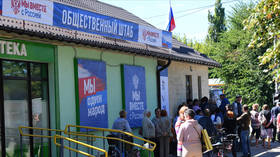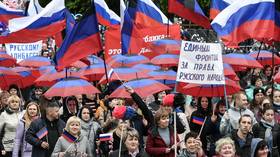West reacts to Donbass referendum plans

Ukraine’s Western backers have responded angrily to plans announced by the Donbass republics on Tuesday to hold referendums on joining Russia. Berlin and Washington were among the first to say they would never recognize the results of the votes.
German Chancellor Olaf Scholz brushed off the upcoming votes as “sham referendums” that “cannot be accepted,” the DPA news agency reported. Such a move would contradict international law, Scholz told journalists on the sidelines of the UN General Assembly in New York.
Earlier, the US said it will “never recognize Russia’s claims to any purportedly annexed parts of Ukraine.” White House National Security Advisor Jake Sullivan told reporters that Washington will always consider them part of Ukraine, adding that the US also “rejects Russia’s actions unequivocally.”
Meanwhile, NATO Secretary General Jens Stoltenberg also branded the upcoming polls “sham referendums” on Twitter, where he called on the international community to “condemn this blatant violation of international law.” The NATO chief described the development as a “further escalation” of the ongoing conflict in Ukraine.
The leaders of the Donbass republics announced on Tuesday that both will hold votes on joining Russia between September 23 and 27. Moscow recognized the two territories as independent republics in February, and demanded that Ukraine officially declare itself a neutral country that would never join any Western military bloc.
Most of the world still regards the territories as parts of Ukraine, however Kiev lost de facto control of both in 2014, when the local populations rejected the outcome of the Western-backed Maidan coup.
Russia sent troops into Ukraine on February 24, citing Kiev’s failure to implement the Minsk agreements, which were designed to give the regions of Donetsk and Lugansk special status within the Ukrainian state.
The protocols, brokered by Germany and France, were first signed in 2014. Former Ukrainian president Pyotr Poroshenko has since admitted that Kiev’s main goal was to use the ceasefire to buy time and “create powerful armed forces.” Kiev insists the Russian offensive was completely unprovoked.













